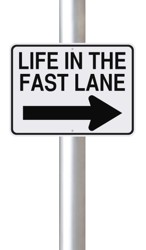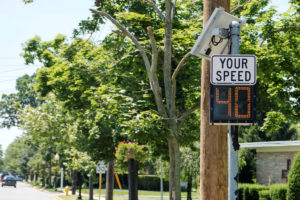It’s pretty well-known that excessive speed is one of the most common factors found to cause motor vehicle collisions. That’s why states, counties, and cities tend to crack down on people who are driving too fast by issuing speeding tickets.
But what about the other end of the spectrum? Is it possible to drive too slow on a roadway?
Absolutely. And many states are now starting to target slower drivers, too.
 These are the new criminals in the left lanes of U.S. roadways.
These are the new criminals in the left lanes of U.S. roadways.
Driving Too Slow is Against the Law
The United States Uniform Vehicle Code, which is the foundation of traffic laws in most states, requires cars who are on a two-lane (or more) road in one direction to move to the right if they are traveling less than the “normal speed of traffic” in their lane. Some states further clarify these laws by mandating this requirement on interstates and/or divided highways. Also, there are states which only target left-lane drivers who are traveling below the speed limit – though others focus on vehicles that are simply blocking traffic in the left lane no matter how fast they are driving.
Why such an emphasis on “too slow” drivers in the left lane? Because the fact that they are slowing traffic could lead to other drivers making risky moves in order to pass, which in turn can result in an auto accident.
States Cracking Down on Slowpokes
In fact, some states have passed new legislation that specifically targets slow left-lane drivers. Last year, New Jersey increased its fine for slow left-lane drivers from $50-$200 to $100-$300. Down in Florida, drivers who travel more than ten miles per hour lower than the speed in the left lane without moving over can get three points on their driver’s license and a $60 fine; that law was also passed in 2013. And earlier this year, Georgia lawmakers approved a bill to impose up to a $1,000 fine and a year in prison to drivers of vehicles on a divided highway or interstate who are blocking the left lane – even if they’re driving the speed limit. (Georgia’s governor still has to sign it.) Most of these types of laws do make exceptions for emergency situations and congested traffic.
 Slowpokes, take note.
Slowpokes, take note.
Slow Driver Ticket = Higher Auto Insurance Rates
New initiatives that crack down on slow drivers can have a serious effect on your wallet. You may think you are being a responsible driver and obeying the law; but you could still get a ticket if you’re in the left lane and don’t move over to the right promptly. Such a moving violation usually goes on your driving record, which means that it gets reported to your insurance company. As a result, your auto insurance premiums could rise by dozens or even hundreds of dollars per year.
There are some measures you can take to keep this from happening to you. The easiest adjustment to make is to never drive in the left lane of traffic unless you are passing someone or are planning to exit or turn left within a mile or less. If you are in the left lane, pay extra attention to your rear view mirror; and move over to the right lane if you see a vehicle approaching at a high rate of speed from behind. Finally, if you do happen to get a slow driver ticket, most states will allow you to erase it from your record by completing a certified driver’s education course in a classroom or online.
AIS Can Help Reduce Your Auto Insurance Rates
If your auto insurance rates go up due to a moving violation or for any other reason, Auto Insurance Specialists may be able to help you find a lower rate from another company. Many AIS customers have saved hundreds of dollars on annual premiums just by switching auto insurers.
To start a quote, call AIS at (888) 772-4247 or visit the AIS Web site today. Until then, drive safely, watch your mirrors, and keep your speed up!
Written by Chris Martin
The information in this article was obtained from various sources. This content is offered for educational purposes only and does not represent contractual agreements, nor is it intended to replace manuals or instructions provided by the manufacturer or the advice of a qualified professional. The definitions, terms and coverage in a given policy may be different than those suggested here and such policy will be governed by the language contained therein. No warranty or appropriateness for a specific purpose is expressed or implied.

